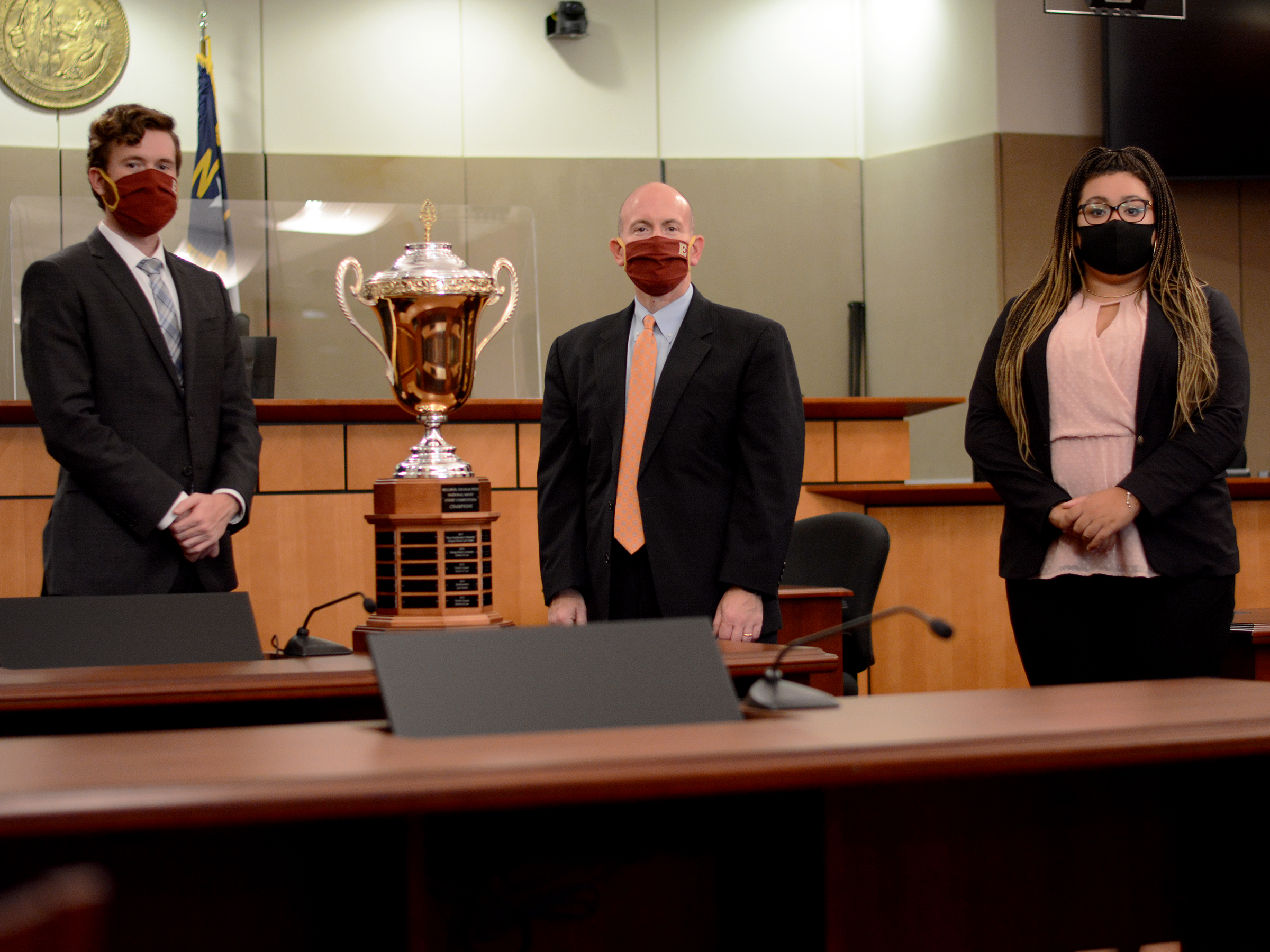A team from George Mason University took top honors in the 11th Billings, Exum & Frye National Moot Court Competition, which welcomed 48 teams from 31 law schools across the United States, making it the largest moot court contest ever hosted by Elon Law.
It was a fictional problem inspired by real events: What are the constitutional implications for a transgender high school athlete, born with male genitalia, seeking to compete against other female athletes?
Does the 14th Amendment guarantee the right to do so? What does existing case law have to say on the question?
For the teams competing in the 11th Billings, Exum & Frye National Moot Court Competition, there were no easy arguments to make, no simple answers to be found, and no shortage of opportunities to develop oral advocacy skills in the largest moot court contest hosted by Elon Law in program history.

Forty-eight teams representing 31 law schools from across the United States went head-to-head in a virtual format from Oct. 23-24, 2020, with Krystalyn Weaver and Evan Draim of George Mason University’s Antonin Scalia Law School prevailing in a championship round over competitors from the University of Oklahoma School of Law.
Weaver also received the championship round’s best oral advocate honor. The final round and the awards program were both streamed live over Elon Law’s Facebook page.
George Mason’s winning team will receive a replica of Elon Law’s Chief Justices’ Cup and have its school name engraved on a permanent trophy that resides at Elon Law. Each individual member of the first-place team will also receive a plaque.
Judges for the final round were:
- The Hon. Albert Diaz
Judge, United States Court of Appeals for the Fourth Circuit - The Hon. James G. Exum, Jr.
Former Chief Justice, North Carolina Supreme Court - The Hon. John M. Tyson
Judge, North Carolina Court of Appeals - The Hon. Robert N. Hunter, Jr.
Former Associate Justice, North Carolina Supreme Court;
Former Associate Judge, North Carolina Court of Appeals - The Hon. Karen E. Eady-Williams
Judge, North Carolina Superior Court - Mr. Ryan Park
Solicitor General of North Carolina – North Carolina Department of Justice

The move to a virtual format for Elon Law’s tournament was precipitated by health and travel restrictions imposed by the COVID-19 pandemic at many law schools.
“2020 has changed the way almost everyone does their jobs, and with that comes many obstacles,” said Casey Robinson L’20, who co-chaired the overall competition for Elon Law’s Moot Court Board. “Attorneys have been learning how to advocate for their clients through Zoom and other virtual formats for months now. Although we could not be in person, I am so glad we were still able to provide a format where competitors across the country could participate in our competition and zealously advocate for their respective sides.”
Hunter Cornelius L’20 co-chaired the overall competition committee with Robinson. He said the online format presented some unique obstacles, particularly in the form of communication and coordinating zoom courtrooms with participants from across the county, and he credited his colleagues on the Moot Court Board with deftly navigating the challenges.
“I think the experience of running and participating in a virtual moot court competition will be invaluable for all of the chairs of the competition, the Elon Law Moot Court Board member hosts, and the participants,” Cornelius said. “Virtual arguments are likely to become more common in practice, even after the end of the coronavirus pandemic. The opportunities to argue and coordinate arguments from zoom will provide great experience and practice for modern legal practice.”

Moot court teams participated in preliminary rounds of oral argument, after which the field was narrowed for octofinal, quarterfinal, semifinal and championship rounds. Teams submitted briefs in advance of the competition, representing either the petitioner or the respondent in the hypothetical case before the Supreme Court of the United States. Competitors were judged on the quality of their appellate brief and oral arguments.
“I was very impressed with the organizational skills, creativity and leadership displayed by the competition chairs, as they hosted our largest-ever national competition this fall during such challenging times,” said Alan Woodlief, senior associate dean and director of the Moot Court Program. “We were honored that so many schools chose to compete at Elon Law and pleased to provide their students the opportunity to sharpen their advocacy skills in the virtual format used by so many courts today.”
Semifinal Round Judges
- The Honorable James L. Gale
Judge, North Carolina Superior Court - The Honorable Thomas H. Lock
Judge, North Carolina Superior Court - The Honorable Sarah N. Lanier L’10
Judge, North Carolina District Court - The Honorable Richard L. Doughton
Former Judge, North Carolina Superior Court - The Honorable Ralph A. Walker
Former Judge, North Carolina Court of Appeals - Mr. Gregg F. Schwitzgebel III
Associate General Counsel, North Carolina League of Municipalities
Past Chair, North Carolina Bar Association Appellate Practice Section - Dean Wendy Scott
Associate Dean for Academic Success and Professor of Law
Elon University School of Law

Elon Law Moot Court Board committee chairs for the 11th Billings, Exum & Frye National Moot Court Competition
- Casey Robinson L’20 and Hunter Cornelius L’20, overall competition co-chairs
- Christine Cline L’20, Brooke LaMachio L’20 and Tori Stout L’20, bailiffs
- Kevin Acuna L’20, Travis Poulos L’20 and Hunter Winstead L’20, judge recruitment
- Chris Schroeder L’20 and Dan Walsh L’20, scoring
- Sarah Byrd L’20 and Samantha Dudley L’20 worked with Senior Associate Dean Alan Woodlief to draft the competition problem
About Elon Law:
Elon University School of Law in Greensboro, North Carolina, is the preeminent school for engaged and experiential learning in law. With a focus on learning by doing, it integrates traditional classroom instruction with course-connected, full-time residencies-in-practice in a logically sequenced program of transformational professional preparation. Elon Law’s groundbreaking approach is accomplished in 2.5 years, which provides distinctive value by lowering tuition and permitting graduates early entry into their legal careers.



